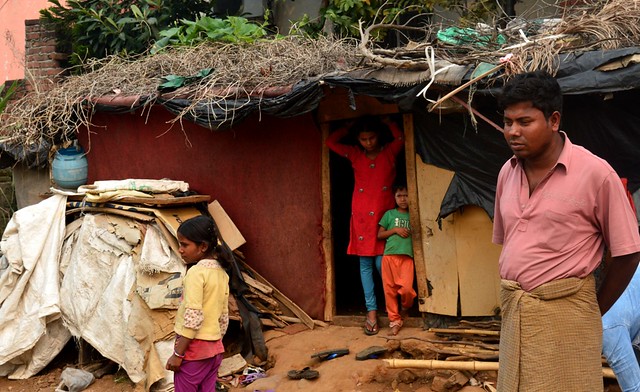By Raqib Hameed Naik, TwoCircles.net
New Delhi: For a number of Rohingya Muslims fleeing persecution in Burma, India has been as a preferred place to start a new life. But while this country might be more peaceful than Burma, life in Delhi’s refugee camp is an ordeal nevertheless; and the constant fight to sustain themselves, a hard reality.
Moved by the plight of the refugees living in Delhi, four students of the MA Convergent Journalism programme of Jamia Millia Islamia (JMI): Muhammad Faisal K, Naureen Khan, Vatsala Singh and Shabeela Rashid, have made a documentary titled ‘I can’t be Mad at Allah’ which narrates the ordeal of Rohingyas in Burma followed by the conditions at the refugee camps in Delhi.

“Muhammad Faisal one of our team member used to regularly visit the Rohingya refugee camp in Delhi where he met Afza and pitched the idea and because of whom the access for us was easy,” says Vatsala Singh.
On Thursday, November 19, the film was screened at Film South Asia Festival-2015 in Kathmandu in the student film category as it qualified among eight South Asian student films.
“The documentary is about Afza, a Rohingya mother of two sons and three daughters who raised her children, only to find them all scattered. We tried to depict how she is struggling to sustain her family in a refugee camp, even as one of her sons is in a jail in Malaysia, while the other is recovering from injuries suffered in an accident. Two of her daughters are presently living with them as they have been abandoned by their husbands .The youngest daughter sustains the whole family from whatever little she earns,” explains Vatsala.
The Rohingyas, a minority Muslim community from Myanmar, have been oppressed and persecuted in Burma for years, with them being denied citizenships and accused of being ‘illegal immigrants’ from Bangladesh. Rohingya Muslims, who are thought to be around one million in number, have been on the receiving end of some of the worst bouts of communal violence in Myanmar’s recent history. Riots between the majority Buddhist community and the Muslim Rohingyas broke out in 2012, resulting in hundreds of people killed, mostly Rohingyas, and hundreds of thousands displaced.
While the Indian government does not officially recognise Rohingyas as refugees, it has allowed the UNHCR to operate a programme for them. UNHCR have already declared Rohingyas as the most persecuted ethnic group in the world.
The documentary has already won accolades and recognitions at Amity Youth Film Festival-2015, New Delhi; Best International Documentary Award at the Eighth Filmsaaz International Film Festival, Aligarh; Third National Students Film Festival at Pune and at the 29th Parnu International Film Festival at Estonia (Charlie Chaplin Association).
Meanwhile, the film has been shortlisted by Al Jazeera for screening in its student’s film section with a different name: ‘A Home Away From Home’ as ‘I can’t be Mad at Allah’ was difficult to translate to the Arabic language.

